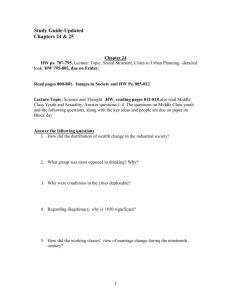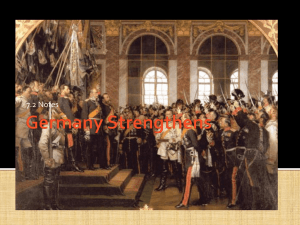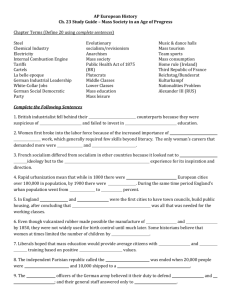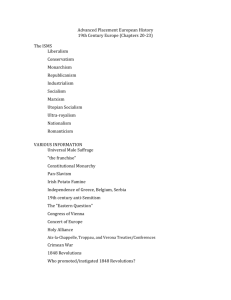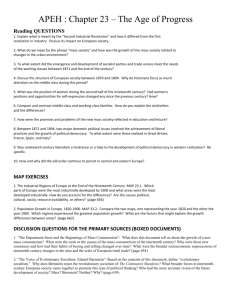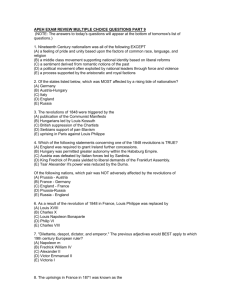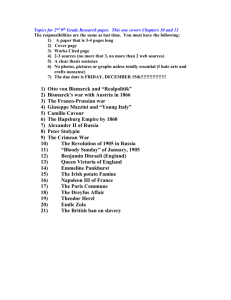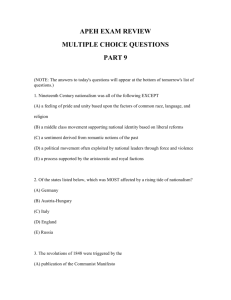Unit 7 Study Guide - Due Block Day Feb 2/3
advertisement
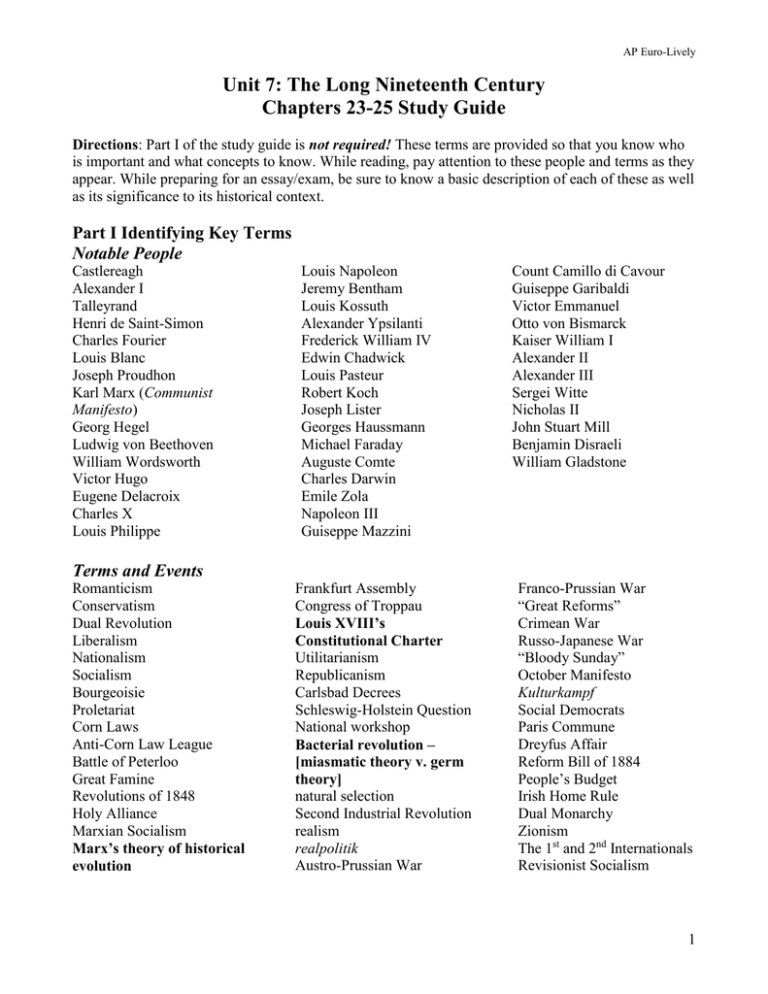
AP Euro-Lively Unit 7: The Long Nineteenth Century Chapters 23-25 Study Guide Directions: Part I of the study guide is not required! These terms are provided so that you know who is important and what concepts to know. While reading, pay attention to these people and terms as they appear. While preparing for an essay/exam, be sure to know a basic description of each of these as well as its significance to its historical context. Part I Identifying Key Terms Notable People Castlereagh Alexander I Talleyrand Henri de Saint-Simon Charles Fourier Louis Blanc Joseph Proudhon Karl Marx (Communist Manifesto) Georg Hegel Ludwig von Beethoven William Wordsworth Victor Hugo Eugene Delacroix Charles X Louis Philippe Louis Napoleon Jeremy Bentham Louis Kossuth Alexander Ypsilanti Frederick William IV Edwin Chadwick Louis Pasteur Robert Koch Joseph Lister Georges Haussmann Michael Faraday Auguste Comte Charles Darwin Emile Zola Napoleon III Guiseppe Mazzini Count Camillo di Cavour Guiseppe Garibaldi Victor Emmanuel Otto von Bismarck Kaiser William I Alexander II Alexander III Sergei Witte Nicholas II John Stuart Mill Benjamin Disraeli William Gladstone Terms and Events Romanticism Conservatism Dual Revolution Liberalism Nationalism Socialism Bourgeoisie Proletariat Corn Laws Anti-Corn Law League Battle of Peterloo Great Famine Revolutions of 1848 Holy Alliance Marxian Socialism Marx’s theory of historical evolution Frankfurt Assembly Congress of Troppau Louis XVIII’s Constitutional Charter Utilitarianism Republicanism Carlsbad Decrees Schleswig-Holstein Question National workshop Bacterial revolution – [miasmatic theory v. germ theory] natural selection Second Industrial Revolution realism realpolitik Austro-Prussian War Franco-Prussian War “Great Reforms” Crimean War Russo-Japanese War “Bloody Sunday” October Manifesto Kulturkampf Social Democrats Paris Commune Dreyfus Affair Reform Bill of 1884 People’s Budget Irish Home Rule Dual Monarchy Zionism The 1st and 2nd Internationals Revisionist Socialism 1 AP Euro-Lively Part II Review Questions Directions: Check your understanding of this chapter by answering the following questions in AT LEAST four-five well written and effective sentences each. 1. What is meant by the term “balance of power”? What methods were used by the Great Powers of Europe to preserve the balance of power at the Congress of Vienna? 2. What are the tenets of classical liberalism? How did liberalism evolve throughout the first half of the nineteenth century? 3. Define nationalism. What were its links to liberalism? Why were both radical philosophies regarded as dangerous to Austrian Habsburg monarchs? 4. How did the Concert of Europe seek to maintain status quo during the “Age of Metternich”? How was European participation in the Greek Revolt atypical of these attempts? 5. What are the goals of socialism? How did socialism evolve from a utopian to Marxist critique of capitalism? In your answer, please refer to the difference between Utopian and Marxist Socialism. 6. What is romanticism? What were its basic tenets, and what were the romantics rebelling against? Provide specific examples of artists and their works! 7. Compare and contrast the political developments in Britain and France between 1814 and 1832. 8. Why in 1848 did revolution triumph briefly throughout most of Europe, and why did it fail almost completely? 9. How did urban life change in the latter half of the nineteenth century, and what was responsible for this change? 10. Analyze the common characteristics that united the broad middle classes in European societies. What differences were seen among the various middle class groups? 11. Analyze the common characteristics that united the working classes in European societies. What differences were seen among the various working class groups? 12. What was the social and economic position of women in the nineteenth century? Were they better off than in preindustrial society? 13. What changed occurred in child care and the attitudes toward children in the nineteenth century? 14. What was the Second Industrial Revolution, and in what ways did it transform life for the general population of the late nineteenth century? 15. Why did a movement of realism replace romanticism after the Revolutions of 1848? How was realism expressed in philosophy, science, politics, art, and literature? 16. How did Napoleon III, Cavour, and Bismarck represent a new breed of conservatism? Why were they different from the reactionary conservatives, like Metternich, that came before them? Provide at least one example for each leader! 17. Compare and contrast the unifications of Germany and Italy. 18. What is the “Eastern Question”? How did it contribute to the collapse of the Concert of Europe? 19. What steps did Russia take towards modernization, and how did such reform contribute to the growth of revolutionary activity in 1905? 20. Define the term “mass politics” and describe the effects of this phenomenon on the European political scene. 21. Describe the reasons for the failure of radical socialism and the victory of evolutionary socialism in Western Europe. 2 AP Euro-Lively 22. How did early nineteenth century nationalism differ from late nineteenth century nationalism? What effects did this evolution have upon international relations? Part III Chronological Awareness Directions: Place the following events in the correct chronological order. Provide the year of each event. Since the events are given to you in a sequence that is out of chronological order, please reorder the events correctly. In the event that one or more of the events listed below do not have a single year in which it took place, provide the appropriate date ranges. Rewrite this list in the correct chronological order, providing the year of the event, occurrence, or trend. 1. Marx and Engels, The Communist Manifesto 2. Congress of Troppau 3. Louis Philippe succeeds to the throne of France 4. Bloody Sunday 5. Louis Pasteur develops pasteurization 6. Austro-Prussian War 7. Louis Napoleon becomes Emperor Napoleon III 8. Dreyfus Affair 9. Repeal of the British Corn Laws 10. Emancipation of Russian Serfs Part IV Multiple Choice Practice Directions: Each of the questions or incomplete statements below is followed by five suggested answers or completions. Select the one that is best in each case, and then write the letter and the answer of your choice on your study guide. 1. The principle of legitimacy is shown in all of the following statements EXCEPT a. The principle of legitimacy was important to the reactionary forces at the Congress of Vienna. b. The Decembrist Revolt put Alexander I on the Russian throne. c. A Bourbon was returned to the French throne. d. After the removal of Napoleon, the rightful king of Spain was returned to his throne. e. Austria forced the return of monarchs to Italy. 2. Three of the major revolts in the 1830s, in Italy, Poland, and Belgium, had which fact or outcome in common? a. Each revolt was successful. b. All three countries lost a bid to create a constitutional government. c. Each of the three countries had just been taken over by one of the German states; they were fighting against those states. d. These three western European countries were fighting against eastern European powers. e. Italy, Poland, and Belgium all fought for independence from a neighboring power. 3. Utopian socialists advocated all of the following EXCEPT a. Overthrowing the owners of factories. b. Following Christian principles to create an ideal socialist society. c. Organizing workers into workshops. d. Building communities for workers. 3 AP Euro-Lively e. Organizing workers by personality type and rotating their work. 4. According to Karl Marx, which best describes the relationship between the government and the bourgeoisie? a. The government ignored the needs of the bourgeoisie. b. The government promoted the proletariat over the bourgeoisie. c. The government distanced itself from the needs of the bourgeoisie. d. The government represented the interests of the bourgeoisie. e. The government attempted to overthrow the bourgeoisie. 5. All of the following were repercussions of the revolutions of 1848 during the ensuing two decades EXCEPT a. the creation of a liberal government in Piedmont. b. the failure of some revolts because of a lack of coordination among the revolutionary groups. c. the independence of Poland from the large multinational Austrian Empire. d. the creation of a constitutional government in France. e. the recognition of Hungarian self-rule in the Austrian Empire. 6. The following statements about Otto von Bismarck are true EXCEPT a. Bismarck was part of the landowning aristocracy of Prussia. b. Bismarck was a leading proponent of Realpolitik. c. Bismarck was a strong advocate of liberalism. d. Bismarck was a shrewd diplomat who kept Germany from being isolated during Prussia’s military conflicts. e. Bismarck lured France into war with Prussia by editing a telegram from King William I. 7. Which statement best reflects the tsarist policies of Russia during the late nineteenth century? a. The Russian government was eager to create a republican form of government. b. The Russian tsar became a strong advocate for reform. c. Political power was gradually transferred from the tsar to the zemstvos. d. Russification allowed all adult males the right to vote. e. Reformers were persecuted and tsarist power remained absolute. 8. All of the following statements regarding the Kulturkampf are true EXCEPT a. Bismarck abandoned the Kulturkampf in order to gain support from the Socialist Democratic Party. b. during the Kulturkampf, Bismarck received support from the liberals. c. Bismarck distrusted Catholic loyalty to the new Germany. d. Bismarck’s agenda proved counterproductive. e. Bismarck abandoned the Kulturkampf in order to concentrate on attacking the socialists. 9. How did the Reform Bill of 1867 influence the Liberal and Conservative parties of Britain? a. Both political parties went after the women’s vote. b. Both political parties were forces to organize more effectively. c. Both political parties sought the support of the monarchy. d. Both political parties embraced socialism. e. Both political parties advocated abolishing the House of Lords. 4 AP Euro-Lively 10. Which of the following best describes the outcome of the Crimean War? a. A defeated Russia retreats from European affairs b. A victorious England becomes more active in European affairs c. Germany seizes the opportunity to declare war on Italy d. Russia establishes closer ties with Austria e. The Ottoman Empire collapses due to its defeat Note: Incomplete study guides will receive a 10 point penalty. This will not be allowed to be made up via redo. Organize your time and work on your study guide a little bit at a time. Substantially incomplete study guides will be graded, but considered late, and only allowed to be redone up to 25 points. Study Guide Grading Rubric. 50 points. Review Questions (20 points) - 4 questions will be selected at random from those above. Each will be worth 5 points. Multiple Choice (10 points) - This section is worth 10 points. 1 point will be deducted for each incorrect response. Chronology (10 points) - This section is worth 10 point. Points will be deducted for each incorrect response. Overall Completion (10 points) - 10 points will be awarded for completion of all questions and parts. 5
